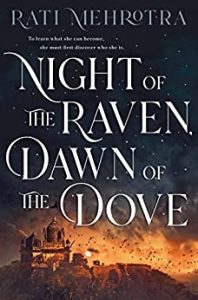Maya C. James Reviews Night of the Raven, Dawn of the Dove by Rati Mehrotra
 Night of the Raven, Dawn of the Dove, Rati Mehrotra (Wednesday Books, 978-1-250-87134-3, $18.99, 352 pp, tp) October 2022. Cover by Devan Norman.
Night of the Raven, Dawn of the Dove, Rati Mehrotra (Wednesday Books, 978-1-250-87134-3, $18.99, 352 pp, tp) October 2022. Cover by Devan Norman.
In Rati Mehrotra’s Night of the Raven, Dawn of the Dove, Katyani’s path in life has been laid out for her since childhood: train to become the best guardswoman of Chandela, advise the crown prince Ayan once he comes of age, and above all else, serve Queen Hemlata, whose use of forbidden magic saved Katyani’s life when she was a child. Adopted into the queen’s royal family, she is fiercely loyal to the crown, and has proven herself time and time again in battle. But after a series of nearly-successful assassination attempts, Katyani and her royal brothers are sent to a gurukul, or monastic school, to train alongside the heirs to the kingdom. Surrounded by deadly monsters even she cannot defeat, she must decide for herself what her destiny is. Night of the Raven, Dawn of the Dove, is a fast-paced YA fantasy set in medieval India. Focusing on Katyani and her journey with her brothers, readers are thrown into a world of political intrigue and simmering romance. There’s forbidden magic, evil and not-so-evil spirits, and unspeakable debts. Author Rati Mehrotra’s worldbuilding is spectacular as well. One specific worldbuilding detail I enjoyed was how Mehrotra wrote about the passing of time. Between the summer, monsoon, and spring, readers get a clear sense of Katyani’s surroundings, but also the length of time she’s spent at the gurukul. Additionally, she adds a glossary in the back for any readers unfamiliar with the vast traditions and sacred texts she draws from.. Notably, there’s an entire section about trees too, which made my inner dendrologist quite happy.
Katyani is a fun and capable protagonist to root for – she’s well-equipped in her duties as a guardswoman, yet makes time for close, loving relationships with her brothers. She also doesn’t spend most of her time talking to other women about Daksh, her stoic crush and son of the Acharya. I’m always excited to see a YA fantasy novel pass the Bechdel test, but Mehrotra also offered us a character whose strength is proven not just on the battlefield, but in her spiritual and emotional practices. Katyani must deal with some heavy realities as well – abusive loyalty, lifelong promises, and a lying kingdom, all of which intersect with a vulnerable time in her life. Despite her lack of support at times, she makes clear-headed and rational decisions that rarely betray her heart or ideals. She’s a solid, complex character that’s quite a joy to read.
Her romantic interest, Daksh, is equally complex. As the son of Acharya Mahavir, he too struggles to understand his destiny outside of what his family has prescribed for him. He’s properly brooding, mysterious, and handsome. The interactions between Daksh and Katyani were both enticing and hilarious, and the romance as believable as it was enticing.
The magic system in the book wasn’t explained word for word, but in a spiritual sense of one’s inner strength and willpower. The concept of bonding magic, for example, is not explicitly described, but it is obvious there are certain rules to it. Katyani is bound to Queen Hemlata, not just by love and affection, but by a magic that is seemingly impossible to break. We do not learn more about this magic until later in the book, and its mysteries only add to the political intrigue of the novel. I quite enjoyed this, but readers hoping for a more corporeal magic system may struggle to understand why some attempts at magic fail, and others succeed.
The pacing is fast as it is ruthless – no character is safe from death or violence, and the stakes get progressively higher as the warring kingdoms up their attacks. Mehrotra offers just the right stride – character deaths hit harder because it feels that readers have spent a tremendous amount of time with them already. Relatedly, I was surprised at how absorbed I became in the story – Katyani’s romantic interests, interactions with spirits, and quest to discover a new destiny for her life were incredibly appealing and interesting. Even more exciting, Mehrotra does not waste any time on unnecessary fluff. While the book could be considered on the shorter end for YA fantasy, it felt like a proper, epic fantasy novel in half the time. I was quite sad to learn it would be a standalone novel but was certainly satisfied with the conclusion.
Maya C. James is a graduate of the Lannan Fellows Program at Georgetown University, and full-time student at Harvard Divinity School. Her work has appeared in Star*Line, Strange Horizons, FIYAH, Soar: For Harriet, and Georgetown University’s Berkley Center Blog, among others. She was recently long listed for the Stockholm Writers Festival First Pages Prize (2019), and featured on a feminist speculative poetry panel at the 2019 CD Wright Women Writer’s Conference. Her work focuses primarily on Afrofuturism, and imagining sustainable futures for at-risk communities. You can find more of her work here, and follow her on Twitter: @mayawritesgood.
This review and more like it in the February 2023 issue of Locus.
 While you are here, please take a moment to support Locus with a one-time or recurring donation. We rely on reader donations to keep the magazine and site going, and would like to keep the site paywall free, but WE NEED YOUR FINANCIAL SUPPORT to continue quality coverage of the science fiction and fantasy field.
While you are here, please take a moment to support Locus with a one-time or recurring donation. We rely on reader donations to keep the magazine and site going, and would like to keep the site paywall free, but WE NEED YOUR FINANCIAL SUPPORT to continue quality coverage of the science fiction and fantasy field.
©Locus Magazine. Copyrighted material may not be republished without permission of LSFF.







